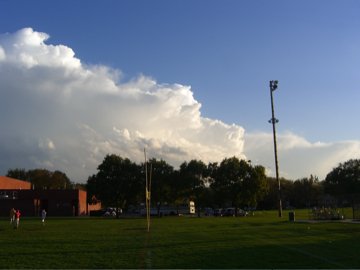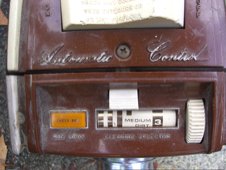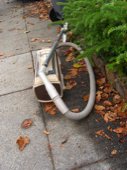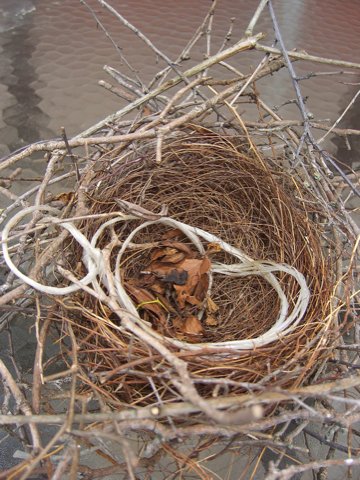Homer was “a living voice in firelight or in the open air, a living presence bringing into life his great company of imagined persons, a master performer at his ease, touching the strings, disposing of many voices, many tones and tempos, tragedy, comedy, and glory, holding his [listeners] in the palm of his hand.”
Today’s Writer’s Almanac says Robert Fitzgerald, who grew up in Springfield, Illinois, and became one of Homer’s great translators, said that. I love the quote (and Homer, too) of course, or I wouldn’t have quoted it.
But there’s a catch. There’s that bracketed word, [listeners]. You see the bracketed or parenthesized word in publications that are trying to make quotes clearer for readers; typically, an editor might come along and replace a pronoun (or nonspecific noun) with the person or thing to whom it refers: “Obama said he wasn’t worried by her lead in the polls” might become “Obama said he wasn’t worried by [Clinton’s] lead in the polls.” Or: “We never doubted we could beat them,” might become “We never doubted we could beat [the Cubs].”
Sometimes this is helpful. But some publications — like the San Francisco Chronicle — seem to have a mania for this kind of “clarifying.” Others, like The New York Times, appear to rely on a different method: making the context of the quote clear enough that the reader knows what the speaker is saying without the editor’s helping hand. I don’t think it’s a hard thing to do; it requires some thought, and it requires some trust in the reader’s intelligence.
Beyond the matter of whether the reader needs the editor’s guidance to get what the speaker is saying, there’s a serious issue here: journalists and scholars are under an obligation to use quotes accurately. They run the risk of interfering with a quote’s meaning and integrity when they substitute their own words for those of the speaker. (And yes, if the writer or editor must clarify a speaker’s meaning, there’s a tried and true way to do it without bastardizing a statement in quotation marks; it’s called paraphrasing.)
Let’s go back to the Writer’s Almanac quote from Fitzgerald. I’m looking at the phrase “holding his [listeners] in the palm of his hand” and trying to figure out what in the world [listeners] is standing in for. It can’t have been a pronoun — ”holding his he/she/it in the palm of his hand.” It’s unlikely to have been a derogatory term or inappropriate slang “holding his hoes and homeboys in the palm of his hand” (though who’s to say Homer didn’t do all that and more?). Maybe it was an ancient Greek or technical literary term that’s so far out there that we poor Writer’s Almanac readers would be stumped if we encountered it.
Thanks to the miracle of the Web, I was able to find the original Fitzgerald quote, which appears in “The Third Kind of Knowledge: Memoirs & Selected Writings.” If you leaf through the portions of the book available online, you’ll find that Fitzgerald does indeed use plenty of phrases straight out of the Greek to illustrate his points. I don’t have a clue to what he’s saying because, among other handicaps, I don’t know the Greek alphabet. Homer this, Homer that — I need an editor’s help to get what Fitzgerald is on about.
Now, here’s the quote The Writer’s Almanac doctored:
“A living voice in firelight or in the open air, a living presence bringing into life his great company of imagined persons, a master performer at his ease, touching the strings, disposing of many voices, many tones and tempos, tragedy, comedy, and glory, holding his auditors in the palm of his hand: was Homer all of this? We can only suppose he was.”
First, and this has nothing to do with word substitution, there’s a real question here whether The Writer’s Almanac has misquoted Fitzgerald. His description of Homer is not a declaration — Homer was all these things — but a question: was he all these things? And it’s not a question he poses idly: He goes out of his way to say that if Homer is all he is imagined to be, the notion is “astonishing, and it is difficult to believe it.” But let’s skip a joy-killing consideration of using quotes in context and go on to the main event.
The horribly difficult and arcane word that needed to be excised in favor of [listeners] was “auditors.” As if readers would stumble on that and picture a crowd of IRS field agents with briefcases instead of an audience. One thing The Writer’s Almanac editors ought to keep in mind the next time they’re faced with a word they think is too hard: Their audience, by virtue of even looking at the site or newsletter, has declared itself literate and willing to do the brain work necessary to understand a few tough words — even ones that you wouldn’t find in “The Pet Goat.”
Technorati Tags: journalism











